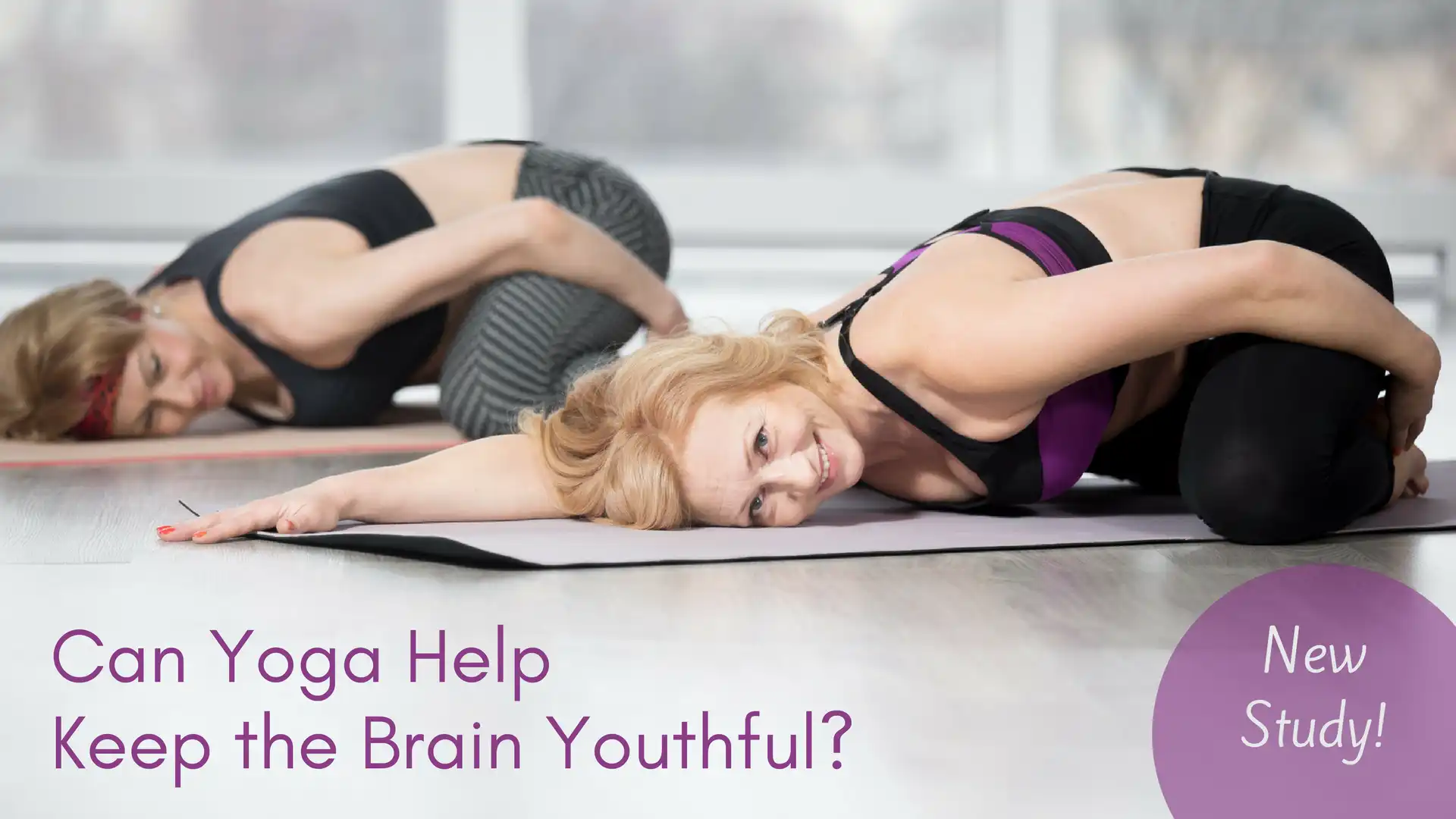Does Yoga Counteract Cognitive Decline? New Study Shows Promising Results

Aging is linked to changes in brain structure and function that may lead to cognitive decline and dementia. New research published in Frontiers of Aging Neuroscience reveals potentially significant brain benefits of yoga for elderly women who practice regularly.
There are a number of changes that occur as our brains age that increase the likelihood that we will forget where we put our keys or parked our car, or have a bit more difficulty remembering people’s names. As the global population ages, more and more of us will be dealing with this reality. Enter yoga.
What makes yoga so potentially effective for brain health is that it combines movement, breathing exercises, and meditation, which studies show positively impact brain structures and functions related to awareness, working memory, attention and executive function. These abilities are needed to keep track of keys, cars, names, and a host of other things.
In the study, 21 women of at least 60 years-old or greater who practiced hatha yoga at least two times per week for a minimum of 8 years (average 14.9 years) were recruited. These yoga practitioners were compared to a sample of women with no prior exposure to yoga, meditation, or other mind-body practices. Participants in the two groups were matched to be equivalent in age, education, and level of physical activity. To be considered, women needed to be free from substance use, tremor, uncontrollable muscle spasms, chronic health problems, neurological or psychiatric disease, and be able to tolerate an MRI scanner.
Women from both groups were asked to complete a series of questionnaires regarding their daily activities and mental state, and screened for depression. Then they underwent brain imaging, during which information regarding the thickness of their cortex (the outer regions of the brain), was obtained and analyzed.
Yoga Fosters Brain Changes Indicative of Improved Cognitive Functioning
Brain imaging results suggested that, on average, healthy older women had greater cortical thickness in the left prefrontal cortex (PFC) compared to women in the control group. Similar to a muscle, the thickness of a region in the brain is believed to increase with repeated use. This suggests that regular yoga practice might stimulate the left PFC.
Why is the left PFC important? Considerable research suggests that this brain region is key to successful cognitive functions including planning, decision-making, memory, word recognition, social behavior, and even the desire to live. These are each key capacities that are important to preserve as we age.
Findings from this study are similar to those conducted with younger yoga and meditation practitioners where the volume of certain brain regions implicated in thinking, planning, reasoning, and memory were enhanced following regular practice.
Several well-designed studies have also pointed to yoga’s benefits for older adults with mild cognitive impairment. In one experiment, elderly participants who completed 12 weeks of yoga demonstrated improved connections between functional regions in the brain responsible for language processing, attention, and self-regulation. What’s more, yoga was also found to positively impact elderly adult’s mental health.
The present research adds to an increasing number of exciting studies finding that yoga improves memory and brain function in aging adults. Although we have yet to understand why or how this happens, or to consistently link brain changes to functional behavior, this is fantastic news for all of us hoping to stay sharp.
If you’re new to yoga, be certain to study with a highly-qualified instructor who understands how to create a safe and satisfying practice for you.
 B Grace Bullock, PhD, E-RYT 500 is a psychologist, research scientist, educator, yoga and mindfulness expert and author of Mindful Relationships: Seven Skills for Success – Integrating the Science of Mind, Body and Brain. Her mission is to reduce stress, increase health and well-being and improve the quality of relationships. She offers classes, workshops, writing and research that combine the wisdom of applied neuroscience, psychophysiology, psychology and contemplative science and practice. Her goal is to empower individuals, groups, leaders and organizations to reduce chronic stress and increase awareness, attention, compassion, mindfulness and effective communication to strengthen relationships, release dysfunctional patterns and unlock new and healthy ways of being. Dr. Bullock is also the Founding Director and Principal Consultant of the International Science & Education Alliance, an organization devoted to exceptional research, program evaluation, assessment design, strategic planning and capacity building to support equity, programmatic diversity and scientific integrity, and promote effective leadership, decision-making and social change. Bullock is a Certified Viniyoga Therapist and Faculty at the Integrated Health Yoga Therapy (IHYT) Training program. She is the former Senior Research Scientist at the Mind & Life Institute and former Editor-in-Chief of the International Journal of Yoga Therapy. For more information see www.bgracebullock.com.
B Grace Bullock, PhD, E-RYT 500 is a psychologist, research scientist, educator, yoga and mindfulness expert and author of Mindful Relationships: Seven Skills for Success – Integrating the Science of Mind, Body and Brain. Her mission is to reduce stress, increase health and well-being and improve the quality of relationships. She offers classes, workshops, writing and research that combine the wisdom of applied neuroscience, psychophysiology, psychology and contemplative science and practice. Her goal is to empower individuals, groups, leaders and organizations to reduce chronic stress and increase awareness, attention, compassion, mindfulness and effective communication to strengthen relationships, release dysfunctional patterns and unlock new and healthy ways of being. Dr. Bullock is also the Founding Director and Principal Consultant of the International Science & Education Alliance, an organization devoted to exceptional research, program evaluation, assessment design, strategic planning and capacity building to support equity, programmatic diversity and scientific integrity, and promote effective leadership, decision-making and social change. Bullock is a Certified Viniyoga Therapist and Faculty at the Integrated Health Yoga Therapy (IHYT) Training program. She is the former Senior Research Scientist at the Mind & Life Institute and former Editor-in-Chief of the International Journal of Yoga Therapy. For more information see www.bgracebullock.com.
Sources
Afonso RF, Balardin JB, Lazar S, Sato JR, Igarashi N, Santaella DF et al. (2017). Greater cortical thickness in elderly female yoga practitioners: A cross-sectional study. Frontiers in Aging Neuroscience, June 20, 2017. doi: 10.3389/fnagi.2017.00201
Maddalena Boccia, Laura Piccardi, and Paola Guariglia, The Meditative Mind: A Comprehensive Meta-Analysis of MRI Studies. BioMed Research International, vol. 2015, Article ID 419808, 11 pages, 2015. doi:10.1155/2015/419808



